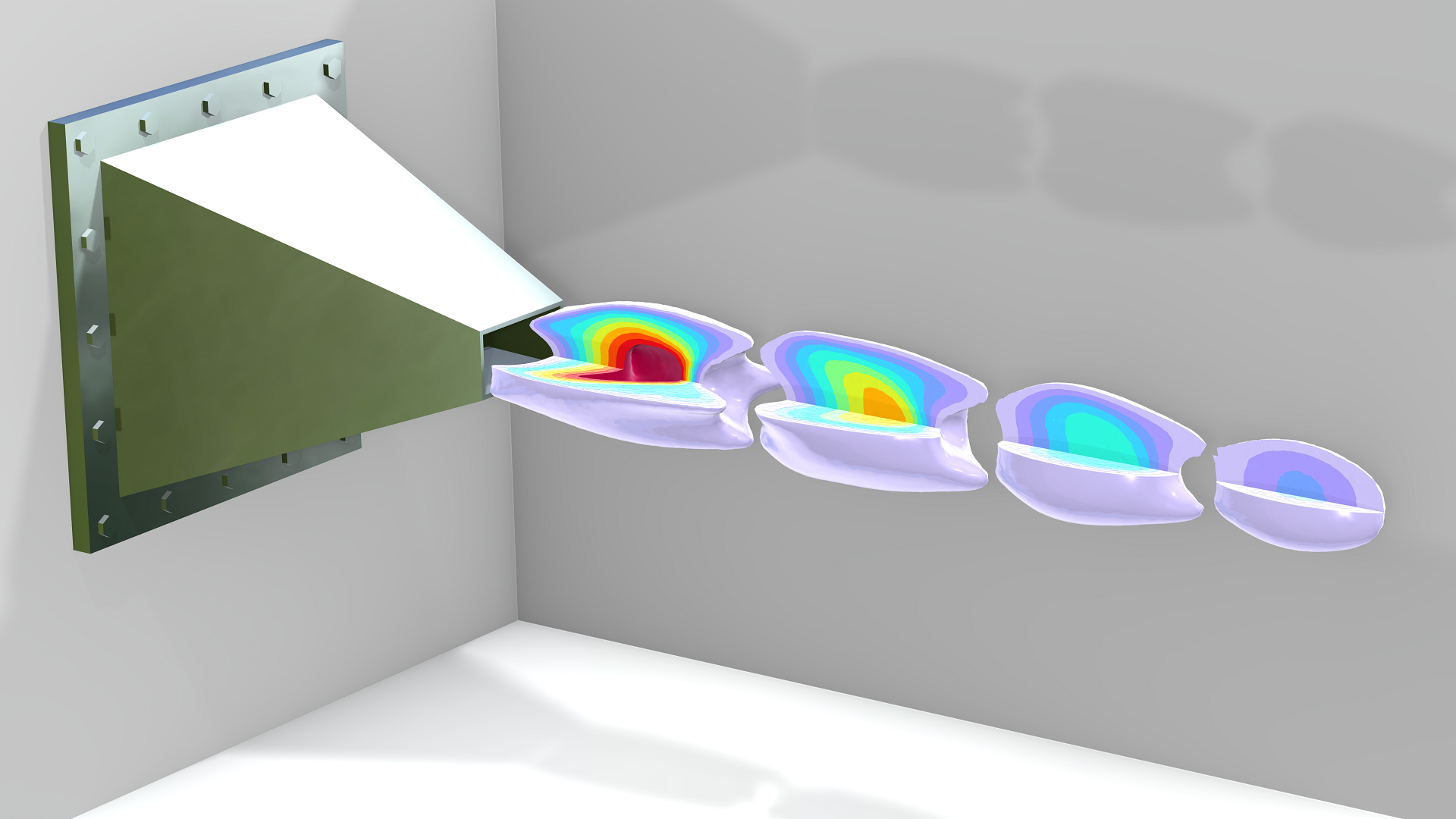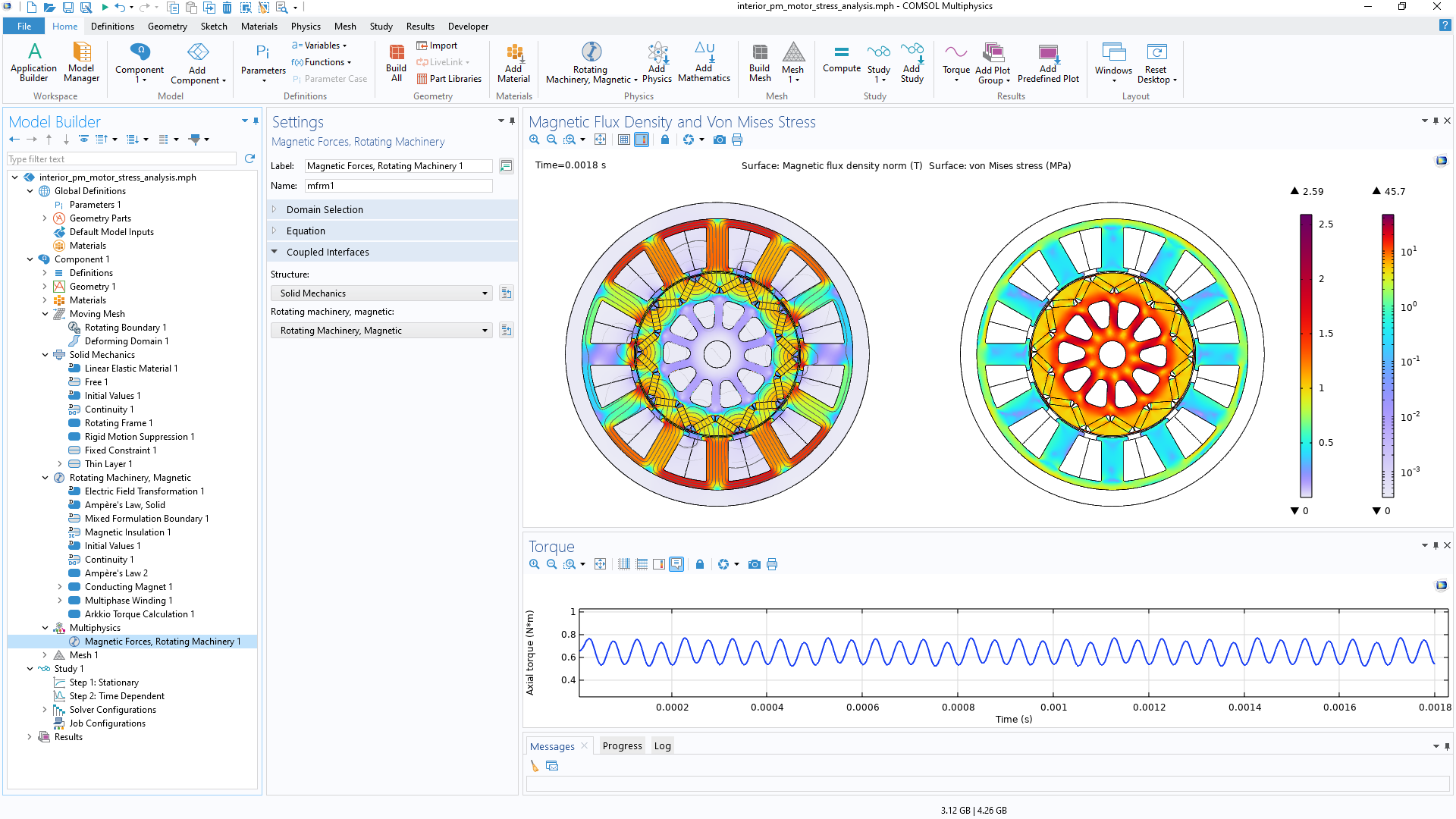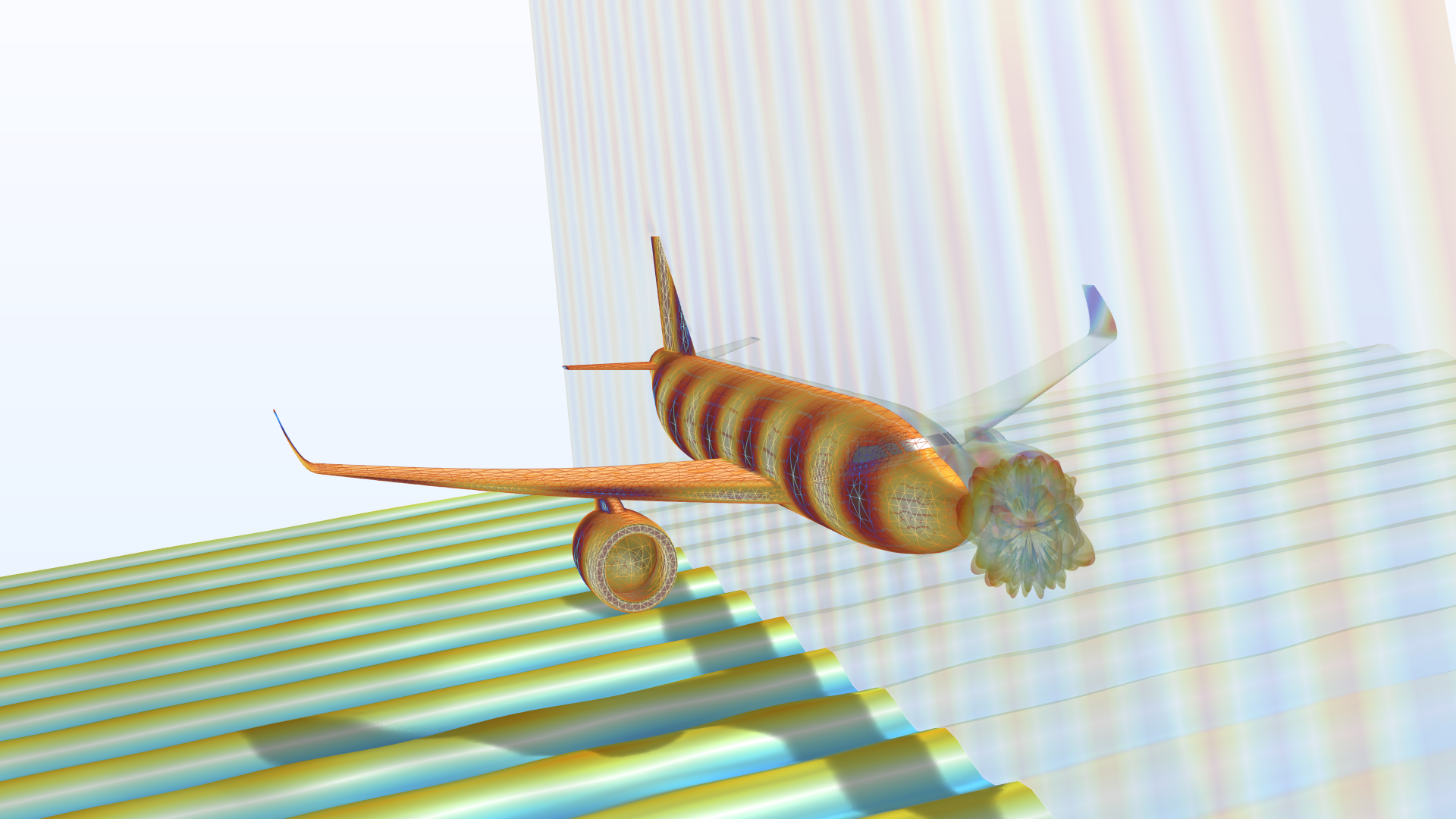Press Release
COMSOL Releases Version 6.2 of COMSOL Multiphysics®
The latest version of the multiphysics simulation software speeds up computations and introduces surrogate model functionality.
BURLINGTON, MA (November 7, 2023) — Today, COMSOL announced the release of COMSOL Multiphysics® version 6.2, adding data-driven surrogate model functionality for efficient standalone simulation apps and multiphysics-based digital twins.
It also features high-performance multiphysics solvers for the analysis of electric motors, up to 40% faster turbulent CFD simulations, and an order of magnitude faster impulse response calculations for room and cabin acoustics. Additionally, it is now up to 7 times faster to perform boundary element analysis (BEM) for acoustics and electromagnetics when running on clusters.
 Turbulent flow simulations are now up to 40% faster, showcased here by high-Mach-number flow through a ramjet nozzle.
Turbulent flow simulations are now up to 40% faster, showcased here by high-Mach-number flow through a ramjet nozzle.
Effective Simulation Apps and Digital Twins
Surrogate models deliver accurate simulation results much faster than the full-fledged finite element models that they approximate. When used in simulation apps, this leads to near-instantaneous results, providing app users with an improved interactive experience. In addition, surrogate models are useful for digital twins, where fast and frequent updates of simulation results are often necessary.
The latest software version also introduces the ability to make simulation apps with automated updates through timer events, which is especially useful when creating digital twins or IoT-connected simulation apps.
"Surrogate models significantly strengthen the app-building capabilities in COMSOL Multiphysics®, and open up new possibilities to our users," says Lars Langemyr, chief scientist at COMSOL. "They can now create effective digital twins and build interactive, computationally fast, and accurate standalone apps."
High-Performance Multiphysics Simulations for Electric Motors
Version 6.2 expands the capabilities for efficient simulation of electric motors as well as for transformers and other electric machinery through a time periodic solver, available in the AC/DC Module. It also enables multiphysics motor analysis involving acoustics, structural mechanics, multibody dynamics, and heat transfer, and makes it possible to run optimization studies to find new motor designs.
"The new solving method makes an important class of electric motor simulations several orders of magnitude faster," says Durk de Vries, technical product manager for the AC/DC Module at COMSOL. "It allows for efficient analysis of multiphysics phenomena that were previously out of reach. This is pivotal for electric motor design optimization, where a balance between structural, thermal, and electromagnetic objectives is essential."

Multiphysics analysis of an interior permanent magnet (IPM) motor combining electromagnetic and structural analysis.
Enhanced Modeling Capabilities Across the Product Suite
In version 6.2, users will discover new modeling features across the board. Core offerings, like visualization and meshing, are improved, and add-on products are expanded and updated. Version 6.2 also adds more than 100 new and updated example models, helping users enhance their modeling skills.
Some highlights from the broadened scope of physics modeling include:
- 7 turbulence models for high-Mach-number flow
- Realistic frequency-dependent materials for acoustics simulations in the time domain
- Modeling of hydrogen embrittlement in solids for fuel cells, electrolyzers, and corrosion
- Extended damage, fracture, and contact modeling
- Easy-to-use specific absorption computations for RF tissue simulations
- Analysis of light propagation through liquid crystals
- Ability to use local weather data for temperature and pressure in simulations, based on a GPS location

The boundary element method, used here for a radar cross section computation, is now up to 7 times faster.
The latest version of COMSOL Multiphysics® solidifies its standing as a comprehensive multiphysics simulation software, offering unmatched physics modeling and simulation capabilities within a single software environment. It also enhances its support for building, maintaining, and compiling standalone simulation apps, thereby extending the use of simulation to individuals beyond the modeling and simulation community.
To get an in-depth look at the latest version, browse the release highlights. Alternatively, for an introduction to COMSOL Multiphysics® and a look at how the updates have enhanced its overall power check out this blog post.
Available Now
COMSOL Multiphysics®, COMSOL Server™, and COMSOL Compiler™ software products are supported on the following operating systems: Windows®, Linux®, and macOS.
About COMSOL
COMSOL is a global provider of simulation software for product design and research to technical enterprises, research labs, and universities. Its COMSOL Multiphysics® product is an integrated software environment for creating physics-based models and simulation apps. A particular strength is its ability to account for coupled or multiphysics phenomena. Add-on products expand the simulation platform for electromagnetics, structural, acoustics, fluid flow, heat transfer, and chemical applications. Interfacing tools enable the integration of COMSOL Multiphysics® simulations with all major technical computing and CAD tools on the CAE market. Simulation experts rely on COMSOL Compiler™ and COMSOL Server™ to deploy applications to their design teams, manufacturing departments, test laboratories, and customers throughout the world. Founded in 1986, COMSOL has 17 offices worldwide and extends its reach with a network of distributors.
COMSOL, COMSOL Multiphysics, COMSOL Compiler, and COMSOL Server are either registered trademarks or trademarks of COMSOL AB.
COMSOL, Inc.
100 District Avenue
Burlington, MA 01803
USA
Phone: +1-781-273-3322
View on a map
Editor Contact:
Mike Nourie
michael.nourie@comsol.com



